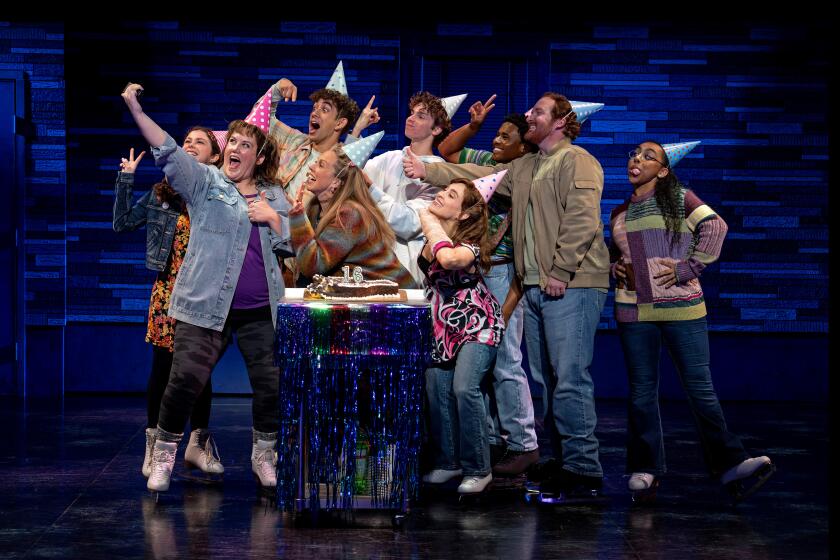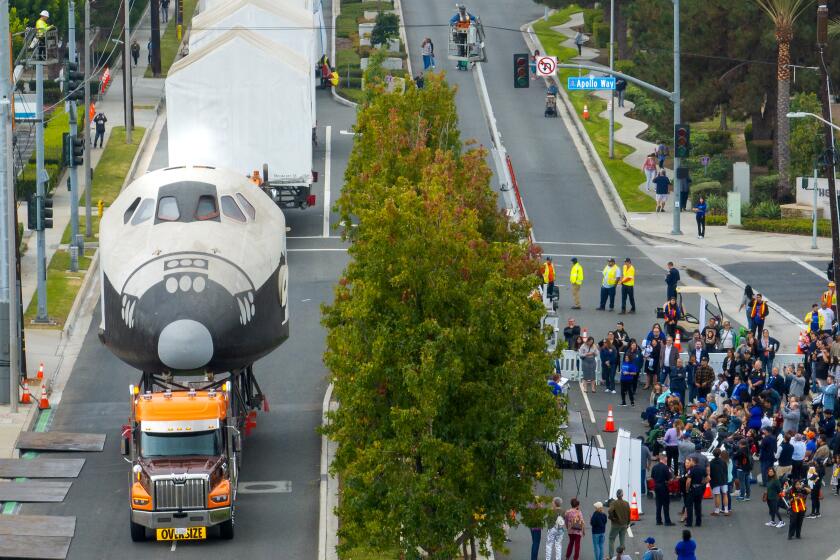‘Trovatore’ that’s about the singing
Standing in line at the Dorothy Chandler Pavilion for Los Angeles Opera’s “Il Trovatore” Thursday, a woman turned to her companion and said, “We are in for some lovely tunes tonight.”
An unsophisticated attitude? Hardly. It is a good bet that this patron knew exactly what to expect. “Il Trovatore” -- as most opera lovers need not be reminded, and now that the Marx Brothers’ “A Night at the Opera” has just been released on DVD, a lucky new generation can joyfully find out -- is not credible drama. It can, however, be credible opera.
Last time around with “Trovatore,” L.A. Opera attempted to take the pariah among Verdi operas very seriously. This was a period, remember, when the opera had not been staged at La Scala for two decades because the famed Italian company claimed it couldn’t find a proper tenor (yeah, sure).
For L.A.’s 1998 production, which is now being revived, director Stephen Lawless spoke of taking grim inspiration from the killing fields of Bosnia, then a leading news story. With a set featuring swords stuck in the ground (looking like crosses in a graveyard) that could be readily inserted into any nearby flesh, Lawless’ production emphasized violence. The “Anvil” Chorus, the brunt of many musical jokes, is no longer funny when it is the clash of steel on the battlefield that makes all the clanking.
Still, you can go only so far with this 15th century Spanish civil war drama. The story takes its bearings from the fact that a vengeful Gypsy woman mistook her own baby for the baby of her enemy and gleefully threw it in the fire. With a wildly uneven cast and a bloodfest onstage, the L.A. Opera audience didn’t know what to think six years ago, and it wound up booing, of all people, an Italian conductor who happened to be the most idiomatic Verdian of the evening.
Now the company has found a better balance. It puts the main emphasis on singing, and the reason you will want to go is to hear Sondra Radvanovsky. As the poison-taking Leonora, she is loved by both Count di Luna (the bad guy) and Manrico (the good guy). The rebel Manrico, raised by Azucena, the Gypsy woman, is Di Luna’s brother, but neither of them knows this, of course, until it’s too late. Enter Groucho.
Radvanovsky is a more melodramatic Leonora than she need be -- enter Chico. But her silent-movie actress gestures are blunted by usefully dim stage lighting. And as the soprano pours herself into the role, she also pours out a stream of really luscious sound. She can appear self-conscious as she carefully shifts gears, one at a time, when she wants to pare down the thick, dusky fabric of her soprano to a small thread of a pianissimo for dramatic effect. And for all her flailing about, she never seems entirely natural onstage. But the voice is a thrill, and she seems close enough to getting the character right that she just might do that one of these days.
The evening’s other impressive singer is Dolora Zajick. She doesn’t exactly underplay Azucena. That’s not in the cards in this opera -- enter Harpo. But Zajick’s Azucena is less deranged than a believably sad, confused old woman at the wrong end of life. Some may be sorry to see that the mezzo shows less fire than she once did, but hers is a touching performance of an often laughable role.
Neither Franco Farina (Manrico) nor Roberto Frontali (Di Luna) concerns himself with subtle characterization, but both are reliably blood-and-guts Verdians. One surprise is bass James Creswell. His Ferrando is hardly the old veteran, but rather an athletic figure with a captivating voice that holds attention.
Perhaps with world attention turned to killing fields other than Bosnia’s, Lawless’ production seems almost dated. The gratuitous ballet has survived, which is strange. After all, there is enough choreography in Benoit Dugardyn’s heavy wooden set, its many panels in regular motion. One gets a little tired of it after a while, but it does a superb job of reflecting voices.
The conductor for the revival is Lawrence Foster, an old friend of the company, and he is at his best -- careful and forceful at the same time. The chorus, so full of demands in its recent contract negotiations with the company, now needs to prove its worth. And persuasive it was Thursday, with its songs of woe and indignant anger. But when it comes to swordplay, it may be better at the negotiating table than with actual steel onstage.
*
‘Il Trovatore’
Where: Dorothy Chandler Pavilion, Music Center, 135 N. Grand Ave., L.A.
When: Sunday, 2 p.m. Thursday,
7:30 p.m. June 5, 1 p.m. June 9, 12, 15, 18, 20, 7:30 p.m.
Price: $25-$170
Contact: (213) 972-8001
More to Read
The biggest entertainment stories
Get our big stories about Hollywood, film, television, music, arts, culture and more right in your inbox as soon as they publish.
You may occasionally receive promotional content from the Los Angeles Times.











